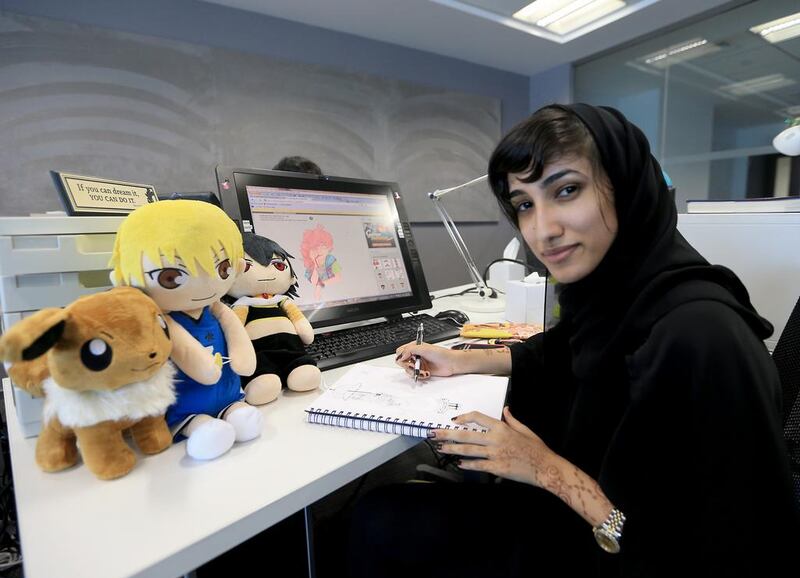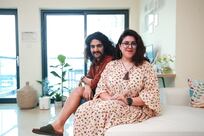They dream of being the Arabian answer to Walt Disney and Nick Park, the creator of Wallace and Gromit. Or maybe the biggest thing since the UAE’s very own Freej grandmothers.
The new generation of students is taking it frame by frame to develop their addiction to animation.
Tadreeb’s Cartoon Network Animation Academy has just taken in its fourth batch of students and Oliver Acker, head lecturer, hopes they will pioneer a regional animation industry – with Abu Dhabi at its heart.
“Being an artist is different from working in an office,” he says. “In this job you’re scared of the day you retire. You want to just produce and create for the rest of your life. It’s the most amazing thing in the world.
“It can be so tiring and difficult and frustrating, but at the same time it’s really rewarding and fun. Who wouldn’t want to make a living doing what they love?”
The 42-year-old animator has crafted an intensive 16-month animation-production course for Cartoon Network based on his knowledge and skills, refined over decades working with some of the world’s most respected studios, including Disney.
The course is run by the Cartoon Network Animation Academy, part of twofour54’s tadreeb training school, which offers more than 200 media training courses. It teaches aspiring animators to produce and write cartoons using traditional techniques. It focuses on traditional hand-drawn frame-by-frame animation, but also incorporates digital animation and visual effects using software.
Students also learn about the creative side of cartoons, writing and character development. Originally a 12-month course, this year’s revised syllabus is divided into four terms, culminating in a final project where all the students collaborate and produce a short cartoon from scratch. Top graduates can intern at the Cartoon Network Arabia studio, also in twofour54.
Cartoon Network Arabia broadcasts hit Cartoon Network shows in Arabic, but hopes to eventually accrue enough talent to produce cartoons that “reflect the design, colour, storytelling, rich history and humour of the region”.
Globally, Cartoon Network broadcasts to 248 million homes in 22 languages across 166 countries.
“It’s best to learn the basics in 2D animation by drawing because you have to craft every frame individually; then you actually understand what the computer does for you,” Mr Acker says. “And it opens up a lot more jobs because it’s always based on the fundamentals.”
The academy is picky about who it accepts, taking an average of 12 students each session.
“Talent is extremely important, but from my experience when someone is a little less talented but has the right attitude, with hard work we can even it out,” he says.
Fatima Almuhairi, 19, is part of a generation of Emiratis who have realised that animation is not just a form of entertainment, but a viable career option too. She flips through a sketch book, showing immaculately drawn characters of differing styles – from Japanese anime to Disney.
“There was a time where I just got really fed up with anime because my favourite characters kept dying. So I went back to western cartoons, they have less drama. Now I’m in-between – I don’t hold a grudge against anime any more.”
Having drawn comics since she was 13, Ms Almuhairi soon considered herself an artist. However, opting for a career in advertising, she started a degree at the American University of Sharjah.
“But I really couldn’t get into it and I didn’t think it was fair of me to be there when I wasn’t as passionate about what I was doing as everyone else – so I left.”
It was during this course that she first showcased her art at a comic-book convention. “I met Oliver there, that’s where they recruited me.”
Mr Acker says it is no cliche – great artists must suffer for their passions. “I do believe you need a struggle. You need to overcome something to develop a strong passion,” he says. “If I could become an animator easily, why would I want to? That’s why the interview process is really important to us, we don’t just take anyone who can pay. I need a sense that they’re really willing to struggle to become an animator.”
He speaks from experience. Animation did not come easy to him. As a child, his school reports said he was a bad student, constantly daydreaming and drawing in class.
“Of course parents don’t like that very much, but part of me was proud of that. That was who I was.”
Yet he did not know animation was a viable career option until he was 17, when he read a newspaper article about Andreas Deja. a German character animator at Disney.
Before the internet, books on animation were scarce in Germany and Mr Acker could ill afford to study. He wrote to famous animators and one replied: “As Walt Disney says, learn how to draw the real thing before you can caricature.” Faced with this daunting task, the young Mr Acker took odd jobs washing windows and delivering newspapers to fund art classes at night.
“Those jobs were all exciting because I had a purpose. And the moment you have a purpose, anything you do in life is fun. ”
Meanwhile, in his spare time he sketched people at the airport and animals at the zoo. In time, he secured an internship at Disney in Paris, eventually working on feature films in Los Angeles and Japan.
Mr Acker was a little sceptical about finding passionate animators in the UAE, an affluent country with a small population.
“But once I did some interviews with potential students, I realised there’s so much passion here. And there’s a lot of ambition to demonstrate that passion, especially among the Emirati females.”
Their struggle, he says, comes from not being able to express themselves as much as they would like. Animation becomes a tool for the students, a way of expressing their feelings, and who have few platforms to do so other than social media.
“We have people coming from outside Abu Dhabi and working on the side,” he says. “I’m really touched by that. That’s the kind of people I want, the ones who are really willing to take a risk or struggle to do this. That is a huge factor in succeeding.”
At the far end of the class, Maryam Alatouni, a 25-year-old Emirati, sits at a computer, calm and content. After taking the course two years ago, she became hooked.
“Actually I couldn’t go away from the course so I attended again. Oliver said I had a place if I still wanted to attend some classes, and that I could assist. Sometimes I help students with software if the teachers aren’t there, and I might do some teaching. I’m also doing freelance illustration for two games – one for kids and one for the iPhone and iPad.”
Other than interning at Cartoon Network Arabia, Ms Alatouni says there are still few opportunities in the country’s burgeoning animation industry. “I feel like my life is here with animation so it’s a great thing that we have an animation course in this region, with a level of professionalism that you can’t find in other institutes. Like any new industry it takes time, but the academy helps a lot.”
Tarek Monzer, 27, from Syria, felt stifled after two years of working in advertising and decided to abandon his career for his true passion.
“I don’t have any particular history with animation but I have been drawing since I was a kid. Since high school, I’ve wanted to work in either animation or the gaming industry, designing concept art and ideas, but back then it wasn’t a viable option.”
He says the medium is starting to gain wider acceptance. His parents, who originally wanted him to study engineering, gave him the push he needed to enrol in the academy.
“People’s views of decent careers, respectable jobs or anything that’s worthy are not just limited to being an engineer or doctor or a businessman any more. Now you can be an artist and when you have a facility like this that really pushes you and makes sure that you come out with the right skill set, what’s left to worry about?”
For Mr Monzer, the experience has been liberating. “It’s something that I love doing and I’m not just doing the same thing over and over again, I’m learning something new. I don’t have a problem just staying in all day and sketching because sketching is one of the very few things that really just makes me lose track of time.
“People say one of two things about turning your hobby into a job. Some say people have hobbies because they want to chill out and escape from reality, but once it becomes a job they hate it. But then others say if you do turn your hobby into your job then you’ll never work a day in your life.
“So far, I’m feeling the latter.”
halbustani@thenational.ae






